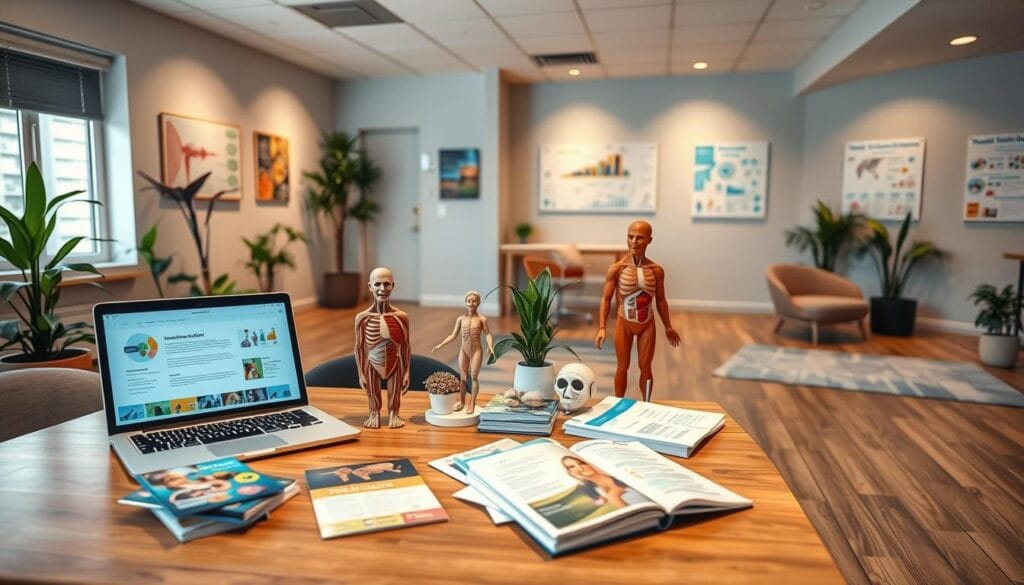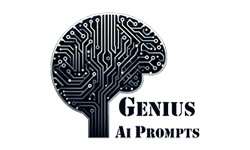Best Prompts for Asking ChatGPT About Disease: 50 Questions to Explore
I’ve always been interested in how technology changes our access to health info. ChatGPT, an AI from OpenAI, caught my eye. It can offer deep insights into health and medicine. Here, I’ll share the best prompts for asking ChatGPT about diseases. This will help you uncover a lot of knowledge and important health insights.
Thank you for reading this post, don't forget to subscribe!Table of Contents
Key Takeaways
- Leverage ChatGPT’s vast knowledge base to gain insights into various medical conditions.
- Utilize 50 effective prompts to explore disease-related information, symptoms, treatments, and preventive measures.
- Understand that ChatGPT is a tool to complement, not replace, professional medical advice.
- Discover the benefits and limitations of using AI-powered platforms like ChatGPT for healthcare research and information.
- Learn how to craft effective disease-related questions that yield valuable and accurate responses from ChatGPT.
Understanding ChatGPT’s Role in Medical Information
Artificial intelligence (AI) has changed healthcare a lot. ChatGPT is a big help in handling medical info. It can quickly find info on diseases, treatments, and research.
Benefits of AI in Healthcare Research
ChatGPT helps a lot in healthcare research. It can spot patterns and guess new ideas fast. This speeds up finding new things. It also makes routine tasks like scheduling easier, so doctors can focus on harder tasks.
Limitations and Ethical Considerations
But, ChatGPT has its limits. Its answers depend on its training data, which might be old or biased. It also can’t update info in real-time. We need to think about privacy and make sure humans check AI decisions in healthcare.
How ChatGPT Processes Medical Queries
ChatGPT uses its training data to answer medical questions. It’s good at talking in a way that feels natural. But, it can’t always get the full picture of a situation. That’s why we need humans to check its answers.
AI like ChatGPT is becoming more important in healthcare. Knowing its good and bad points helps us use it to help patients and improve research.
| Potential Benefits of AI in Healthcare | Potential Limitations of ChatGPT in Healthcare |
|---|---|
|
|
AI is changing healthcare, and ChatGPT is a big part of that. Understanding its strengths and weaknesses helps us use it to improve care and research.
Best Prompts for Asking ChatGPT About Disease
Getting the right information from ChatGPT about diseases starts with good prompts. This section shows you prompts for getting detailed info on medical conditions, symptoms, and treatments. You can adjust these prompts for your health questions, getting precise and detailed answers from the AI.
Here are some top prompts to ask ChatGPT about disease info:
- Give a detailed overview of symptoms, causes, and risk factors for [specific disease].
- Sum up the latest research on treatments and their success for [specific condition].
- Explain how genetics and environment play a part in [specific disease].
- Describe how doctors diagnose [specific disease], including common tests.
- Talk about possible long-term issues and outlook for people with [specific condition].
- Outline steps to prevent and lifestyle changes to lower [specific disease] risk.
- Compare the success of different medicines or therapies for [specific condition].
- Discuss the newest research and treatments for [specific rare or complex disease].
Using these ChatGPT prompts, you can dive into many disease information queries. This will give you important insights into different medical issues. Make sure to customize the prompts for your health concerns to get the most accurate and detailed answers.
“The key to getting the most out of ChatGPT is to ask the right questions. These prompts are designed to help you uncover comprehensive information about diseases and medical conditions.”
Crafting Effective Disease-Related Questions for ChatGPT
When you ask ChatGPT about health, how you ask matters a lot. The right structure and elements in your questions can make the AI’s answers better and more helpful. Knowing what makes a good medical question can help you get the most accurate and relevant info.
Structure of Medical Prompts
Good prompts for ChatGPT about diseases should have a few key parts:
- Clear context: Give a quick summary of the health issue or symptom you’re asking about.
- Specific details: Share important info like the patient’s age, gender, and medical history.
- Focused question: Ask a direct and specific question that you want the AI to answer.
Essential Elements to Include
To make your medical prompts complete and useful, include these important parts:
- Appropriate medical terminology: Use the right and exact words to describe the condition or symptom.
- Demographic information: Give details about the patient’s age, gender, and other key characteristics.
- Relevant medical history: Share any past diagnoses, treatments, or health-related info that’s important.
Common Pitfalls to Avoid
When asking ChatGPT about health, avoid some common mistakes. These can limit the AI’s ability to give good info. Here are a few to watch out for:
- Vague questions: Don’t ask broad or open-ended questions that are too general.
- Requests for diagnoses: ChatGPT is not a doctor and should not be used to diagnose conditions.
- Expectation of personalized advice: The AI can only give general info and can’t offer specific treatment plans.
By following these tips, you can use ChatGPT to learn about health topics, get valuable insights, and better understand diseases and conditions.
| Effective Prompts | Ineffective Prompts |
|---|---|
|
|
Disease Symptoms and Diagnosis Prompts
Technology is changing healthcare, making AI chatbots like ChatGPT key in finding disease symptoms and making diagnoses. It’s important to know what they can and can’t do.
When using ChatGPT for health questions, remember it’s good at recognizing patterns and handling big data. But, it might not get rare or unusual cases right. Here are some tips to use ChatGPT well:
- Start with specific symptom-focused prompts: For example, “What are the common symptoms of [insert disease name]?” or “Could my [insert symptom] be a sign of [insert disease]?”
- Inquire about diagnostic procedures: Ask ChatGPT about the typical tests or examinations used to diagnose a particular condition, such as “What tests are used to diagnose [insert disease]?”
- Explore differential diagnosis considerations: Prompt the AI to provide a list of potential causes for a set of symptoms, allowing you to better understand the thought process behind reaching a diagnosis.
- Seek guidance on when to seek medical attention: Ask ChatGPT questions like “When should I see a doctor for [insert symptom]?” to understand the urgency and importance of seeking professional medical care.
ChatGPT is a helpful tool in healthcare, but it can’t replace a doctor’s expertise. Use it to learn more, but always talk to a doctor for a real diagnosis and treatment plan.
| Statistic | Value |
|---|---|
| Americans who believe AI will surpass humans in diagnosing and treating medical conditions | Two in three |
| Americans willing to follow medical advice generated by AI | Four in 10 |
| Accuracy of medical advice given by ChatGPT according to PLOS One study | Relatively low, despite high relevance |
| Weekly ChatGPT users worldwide | About 200 million |
| Weekly ChatGPT users in the United States | Almost 68 million |
| Average ChatGPT session duration in January 2024 | 13 minutes, 35 seconds |
Remember, while ChatGPT can be a valuable tool in understanding disease symptoms and exploring potential diagnoses, it should always be used in conjunction with professional medical advice. Consult with a healthcare provider for personalized guidance and treatment recommendations.
“AI excels at pattern recognition but may struggle with atypical presentations or rare conditions that require deeper clinical judgment.”
Treatment and Prevention Query Templates
Understanding disease treatment options and preventive healthcare is key for managing health. ChatGPT helps by giving tailored answers to specific questions. These questions can range from traditional treatments to new ones and lifestyle changes for better health.
Understanding Treatment Options
Ask about common treatments for a condition, like “What are the most commonly prescribed medications for managing type 2 diabetes?” or “Can you provide an overview of the surgical options available for treating knee osteoarthritis?” ChatGPT can give detailed info on treatments, how they work, and their benefits and risks.
Prevention Strategies
Ask ChatGPT about preventive healthcare for certain health issues. For example, “What are the recommended screening guidelines for breast cancer in women over 40?” or “Can you suggest lifestyle changes that may help reduce the risk of developing heart disease?” It can offer tips on how to stay healthy.
Lifestyle Modifications
Ask about lifestyle changes for health that help with treatment or prevention. Questions like “How can diet and exercise impact the management of type 2 diabetes?” or “What are some stress-reduction techniques that may benefit individuals with chronic pain?” can show the value of a whole-body approach to health.
Using these prompts, you can learn a lot about treatment options, preventive healthcare, and lifestyle modifications for different health issues. Always talk to a doctor for advice that fits your needs.
“The most effective treatments often involve a combination of medical interventions and lifestyle changes tailored to the individual’s needs.”
Healthcare Information and Patient Education
In today’s world, finding reliable health info is key for everyone. ChatGPT, a smart language model, helps people learn about their health. It offers patient education resources, boosts healthcare literacy, and makes medical information access easier.
ChatGPT is great for explaining health terms, conditions, and treatments in simple terms. You can ask it questions like “What’s the difference between a virus and a bacteria?” or “How does our immune system work?” This helps you understand health basics better.
It also helps you navigate the healthcare system. You can ask about finding good doctors, understanding insurance, and dealing with healthcare paperwork. Questions like “How do I find a reputable doctor?” or “What are the main types of health insurance?” make you more confident in your health choices.
ChatGPT is also good for learning about preventing and managing diseases. You can ask about stopping the flu or treating high blood pressure. This way, you learn how to stay healthy and manage health issues.
Using ChatGPT can improve your healthcare literacy. It helps you make better health choices and take charge of your health journey.
“Access to accurate and understandable health information is a fundamental human right. ChatGPT can play a vital role in empowering individuals to take charge of their health and make informed decisions.”
Remember, always talk to doctors for personal advice. ChatGPT is a helpful tool, but it’s not a substitute for medical professionals.

Medical Research and Clinical Studies Prompts
Exploring medical research and clinical studies can deepen your health knowledge. Using AI chatbots like ChatGPT, you can quickly find important insights. This is great for medical students, healthcare workers, or anyone wanting to learn more about health.
Finding Relevant Studies
Start by asking the AI to find studies on a topic you’re interested in. Ask it to summarize recent research or compare treatments. This saves time and keeps you updated with new medical discoveries.
Understanding Medical Statistics
Medical research uses complex stats to understand findings. Ask the AI to explain stats like significance levels and odds ratios. This helps you understand study results better, making informed decisions easier.
| Prompt | Potential Insights |
|---|---|
| Summarize the latest research on the efficacy of a new cancer treatment. | – Overview of recent clinical trials – Key findings on the treatment’s success rates – Comparison to existing standard treatments – Potential side effects and contraindications |
| Explain the statistical methods used in a study on the risk factors for heart disease. | – Description of the study design (e.g., cohort, case-control) – Explanation of the statistical tests employed (e.g., regression analysis, hazard ratios) – Interpretation of the p-values, confidence intervals, and effect sizes – Limitations and potential sources of bias in the study |
| Compare the benefits and risks of two different diabetes management approaches. | – Detailed comparison of the treatment outcomes (e.g., glycemic control, complication rates) – Analysis of the statistical significance and clinical relevance of the findings – Evaluation of the quality of the supporting evidence (e.g., sample size, study design) – Recommendation on the most appropriate approach based on the available data |
Using these prompts with AI chatbots can help you understand medical research better. This knowledge empowers you to make informed health decisions for yourself and others.
Navigating Complex Medical Conditions
Dealing with rare diseases, chronic illnesses, or comorbidities requires detailed information and personalized advice. ChatGPT can help in understanding these complex health issues. However, it’s vital to be cautious and careful in using it.
To learn about rare diseases, ask questions like: “What are the common symptoms and diagnostic criteria for [rare disease]?” or “Can you provide an overview of the current treatment options and prognosis for individuals with [rare disease]?” These questions can help you grasp the specifics of uncommon medical conditions.
For managing chronic illnesses, you might ask ChatGPT: “What are the recommended lifestyle modifications and self-care strategies for individuals living with [chronic condition]?” or “Can you explain the potential comorbidities associated with [chronic condition] and how they are typically managed?”
- Prompts for comorbidity queries could include: “How do [condition A] and [condition B] interact, and what are the implications for treatment and disease management?”
- Additionally, you can ask: “What are the potential complications and increased risk factors when someone has [condition A] and [condition B] simultaneously?”
While ChatGPT offers valuable insights, it should not replace professional medical advice. Always consult with your healthcare provider for personalized guidance and treatment recommendations, especially when dealing with complex or rare medical conditions.
“ChatGPT can be a useful tool in exploring complex health scenarios, but it’s crucial to approach the process with care and seek professional medical guidance.”
Conclusion
ChatGPT is a powerful tool for health and medical information. It has both great potential and limitations. Always remember, professional medical advice is the best choice for your health.
The future of AI in healthcare looks bright. It could change patient care, medical research, and disease prevention. But, it’s important to check the accuracy of AI medical info before using it. This way, we can make the most of these new technologies.
When using ChatGPT for health info, see it as a helper, not a replacement for doctors. Using AI wisely, along with traditional healthcare, helps you make better health choices. This also helps advance AI in healthcare.
FAQ
What are the benefits of using ChatGPT for medical information?
What are the limitations and ethical considerations of using ChatGPT for medical queries?
How does ChatGPT process medical queries?
What are the key elements to include in effective disease-related prompts for ChatGPT?
What are some common pitfalls to avoid when asking ChatGPT about diseases?
What types of disease symptom and diagnosis-related prompts can I ask ChatGPT?
What kind of treatment and prevention-related prompts can I use with ChatGPT?
How can I use ChatGPT to access reliable healthcare information and improve my medical literacy?
What kind of medical research and clinical study-related prompts can I ask ChatGPT?
How can I use ChatGPT to explore information on complex medical conditions?
Source Links
- Seen anything novel by o1-preview? – openai.com
- ChatGPT won’t analyze images anymore – openai.com







